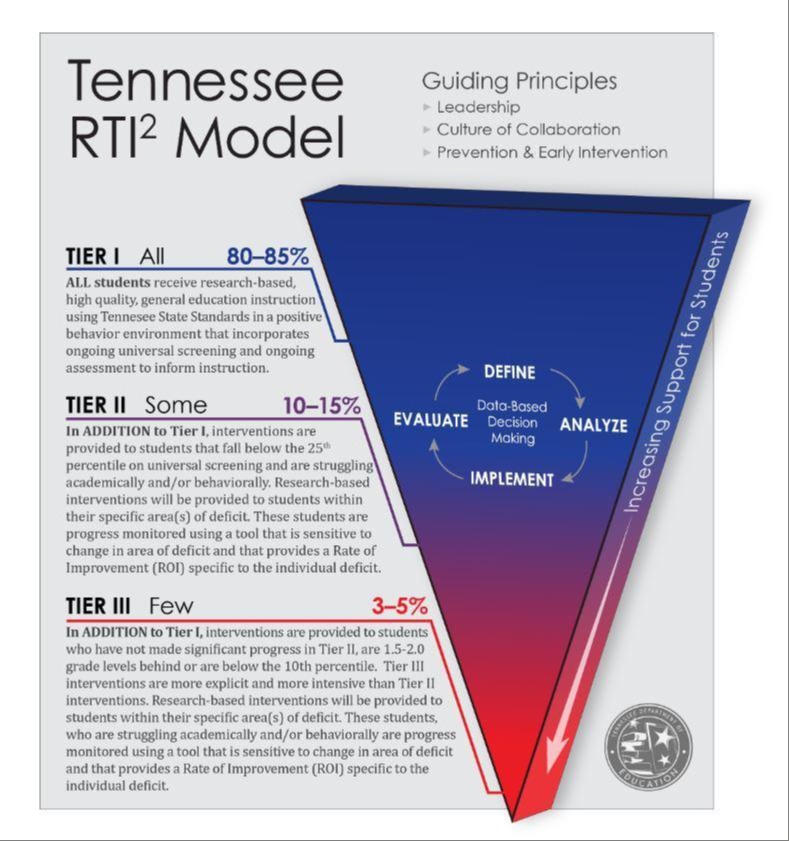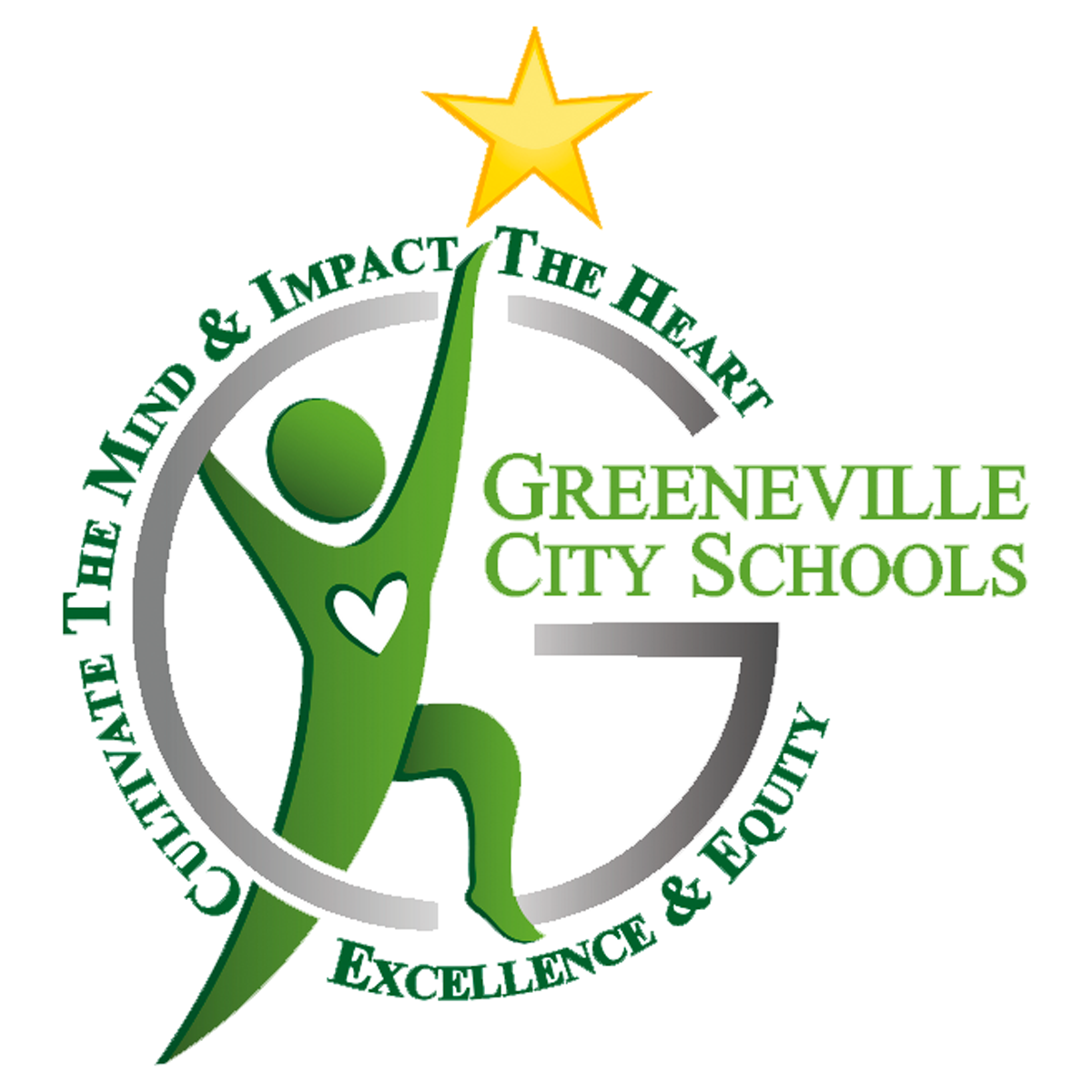Teaching & Learning
Assessments
Throughout the school year, several assessments are administered to students to determine academic progress and performance. Information gained from student testing is also used to communicate student, school, and school system performance and to guide improvements in our curriculum and instruction. The assessment calendars outline the test, testing window, grade levels, purpose and use, and the manner in which parents are informed.
Response to Intervention (RTI)
Greeneville City Schools is committed to helping all children be successful in the classroom. One form of support is Response to Instruction and Intervention (RTI2). RTI2 is a multi-tiered delivery system that uses a problem-solving model based on data to identify a specific student's need and direct instruction towards that need.

Tennessee State Standards
TIGER Teacher Evaluation
Greeneville City Schools utilize the Teacher Instructional Growth for Effectiveness and Results (TIGER) Teacher Evaluation Model as the process to promote teacher growth. The TIGER Teacher Evaluation Model was developed by practitioners within the Association of Independent of Municipal Schools (AIMS) districts for practitioners. The model is designed to promote teacher growth and to ensure all teachers provide quality instruction that aligns with district goals and curriculum.
A number of Tennessee AIMS districts organized themselves into a consortium to explore teacher evaluation and related “best practices” during the spring of 2010. In partnering initially with Battelle for Kids, the consortium members reviewed a Literature Review on teacher evaluation and participated in professional growth opportunities. Related research by Battelle for Kids through the AIMS Consortium process indicated that an effective evaluation system involves the following components:
Continuously assesses and reflects, providing feedback for continuous growth
Reflects research-based standards
Involves the collection and review of qualitative and quantitative data
Is developed using feedback and information from all parties involved in the processes (principals, teachers, unions, etc.)
Includes a process of recalibration of the evaluators to ensure the rubrics are being used correctly (ensuring inter-rater reliability)
Is reviewed and fine-tuned to reflect the changing needs of the organization.
The end result of the Consortium’s work resulted in recommendations for a differentiated teacher evaluation process. The group established a Core Committee that focused on the work being led by the Tennessee Teacher Evaluation Advisory Committee (TEAC). In alignment with the work of the TEAC at that point in time, several different teacher performance standards (rubrics) were considered. The Core Committee engaged Edvantia, Inc. to help it refine the model, develop the tools/forms, and adapt a condensed version of Charlotte Danielson’s rubrics (Enhancing Professional Practice: A Framework for Teaching, 2007).
Charlotte Danielson’s Framework was selected because of its vast usage and study since it was first introduced in 1996. Charlotte Danielson remains highly regarded and in great demand in the field of teacher evaluation. Her work serves as the basis for many of the current teacher evaluation models one might choose to study.
The guiding principles of TIGER include the following:
TIGER is based upon a set of quality teacher performance standards (a condensed version of Charlotte Danielson)
The model is focused on a continuum of teacher growth for effectiveness and results
The teacher evaluation process is both formative and summative and results in a tiered approach of teacher support (resulting in stages of teacher growth)
TIGER includes a “coaching” component for Stage One and a leadership component in Stage Three
The model utilizes and encourages professional learning communities of teachers
TIGER aligns the qualitative evaluation component with the quantitative component.
TIGER is steeped in the belief that “one size does not fit all.” In order to help all teachers be successful — measured by their students’ success – and ensure that the mandatory process of evaluating “every teacher every year” occurs as is absolutely necessary, differentiation must occur. The formative nature of the model that allows for continuous teacher growth and improvement based on both qualitative and quantitative data distinguishes this practitioner-developed model. All the above information derived from the Tiger.model.net website.
Family Life Curriculum
The Greeneville City Schools Family Life Curriculum will be taught to students in grades Kindergarten through high school in all schools. This is in compliance with Tennessee Code Annotated 49-6-1301-1304 which mandates our school system implement a program of Family Life instruction for students. The Family Life Curriculum team has worked to make this an age-appropriate instructional program following the Tennessee standards. All classes are taught by the system's teachers, counselors, nurses, or Greene County Health Department personnel. All students will participate in GCS Family Life Curriculum classes unless a parent/guardian submits a written request to the Principal to exempt his or her son/daughter.
Students may be exempt from the Family Life unit according to T.C.A. 49-6-1303: "Upon receipt of a written statement from a student's parent or guardian to the effect that the parent or guardian has personally examined the appropriate grade level instructional materials or has conferred directly with the student's instructor, school counselor or principal and that the parent or guardian finds objectionable any or all portions of family life instruction, the student shall be excused from such portion or portions of family life instruction."
The Family Life curriculum is available below. If you have any questions, please email Shelia Newland.
